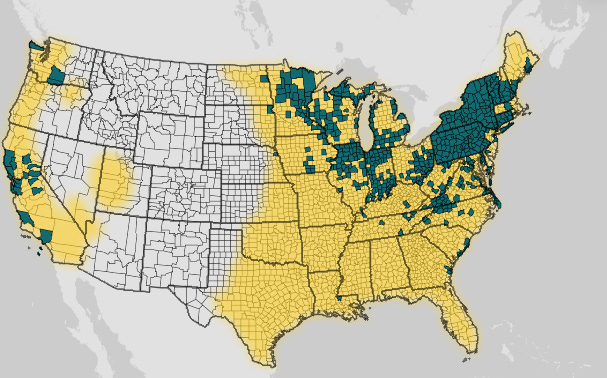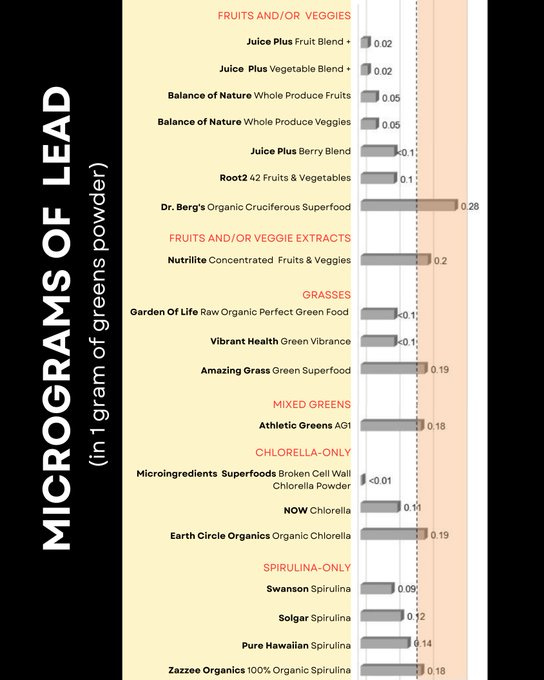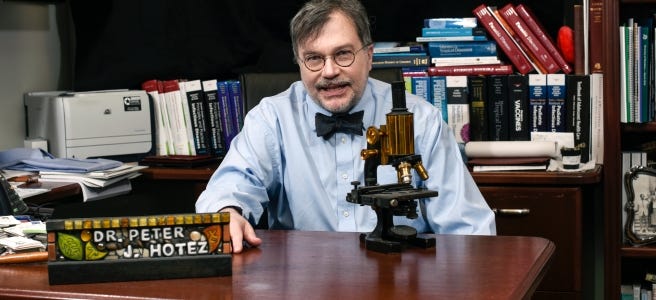Personal Science Week - 230629 Debating Science
Scientists should debate, Ticks, and evaluating supplements
Personal Scientists are open to all ideas, even crazy ones, but our skepticism is always firmly intact. This week we discuss one professional scientist’s refusal to debate and the implications for the rest of us.
The Science of Debate
Peter Hotez is a Houston-based medical doctor and professor who gained national prominence during the COVID pandemic as a science communicator. (Fun fact: he wrote a whole academic paper (2018) on How to craft your scientist brand.)
Now, at least among the noisier parts of the Twittersphere, he’s famous for his refusal to debate Presidential Candidate Robert F Kennedy, Jr., in a challenge proposed by uber-podcaster Joe Rogan. Unbelievably, those on the “don’t debate” side include the Editor of Science Magazine, and many, perhaps most prominent public scientist advocates. What gives? An unwillingness to challenge your ideas is practically the definition of anti-science!
That said, let’s be realistic. RFKJr is a trained trial lawyer with years of high-pressure, high-stakes litigation experience. He’s also been maniacally focused on the subject of vaccines for decades, at great personal cost of family and long-time friends. As an (aspiring) politician, he intuitively understands the distinction between persuasion and “truth”. If the goal is to convince an audience, does anyone think Hotez would stand a chance?
But if truth is the goal, then science requires a response to RFKJr’s claims. You cannot aspire to be a scientist if you’re unwilling to confront every possible theory, including the most whacko ones. For example, here’s what Nobel-winning physicist Richard Feynman says about the French pilgrimage site famous for curing diseases:
It might be true that you can be cured by the miracle of Lourdes. But if it is true, it ought to be investigated. Why? To improve it …if the healing process works at Lourdes, the question is how far from the site of the miracle can the person, who is ill, stand? Have they in fact made a mistake and the back row is really not working? Or is it working so well that there is plenty of room for more people to be arranged near the place of the miracle? … You may laugh, but if you believe in the truth of the healing, then you are responsible to investigate it, to improve its efficiency and to make it satisfactory instead of cheating. For example, it may turn out that after a hundred touches it doesn't work anymore. Now it's also possible that the results of this investigation have other consequences, namely, that nothing is there.
In other words, whether the Miracle at Lourdes is “true” or not is irrelevant to science, which is focused on the implications of the phenomenon. Similarly, whether we’re discussing the “truth” of climate change, vaccine efficacy, or even the Flat Earth, true science takes all theories seriously but demands that we challenge them with followup questions until we run out of ways to productively test the consequences.
Do vaccines cause autism? It seems to me that this has been investigated enough that the bar for believing RFJ Jr’s is pretty high. But let’s not ignore the many well-intentioned, intelligent people who are concerned. Millions of people consider this to be a legitimate question, and want honest answers that don’t boil down to “just trust us”.
Peter Hotez’ refusal to debate comes across to me as, well, arrogant — as though he’s too important to bother with anybody who’s “not a real scientist”. Rather than dismiss those of us who just want to know the truth, he should propose an alternative to the Joe Rogan-moderated format:
Written debate: both sides can submit their point-counterpoint as a series of lengthy written comments.
Courtroom-style face-to-face: As in a legal procedure, require both sides to submit all of their evidence in advance. Allow for oral arguments and questioning, but only permit factual references that have been pre-specified in advance.
Alternate representative: If Hotez lacks the training for a rigorous response, he should propose as his surrogate somebody who is. Take up the offer made by one of my favorite thinkers, for example: Alan Levinowitz, a religion professor who wrote one of our favorite diet books ever and knows a thing or two about how to deal with crazy ideas.
RFJ Jr makes specific claims, often about matters of fact that a true expert should be able to evaluate and explain. If Hotez lacks the depth to refute those claims one by one, I for one would like to see somebody tackle the challenge.
So far the best response I’ve seen comes from Vinay Prasad: Take RFK Jr Seriously: what he gets right and wrong: a point-by-point, good faith breakdown of RFK Jr’s arguments. (Spoiler: RFK Jr is rightly skeptical about the conflicts of interest and poor science conducted by Big Pharma, but his criticisms of the autism studies are speculative at best. And much of the “anti-vax” pejorative is disingenuous and lacks appropriate nuance).
Tick season
Speaking of vaccines, did you know that an effective vaccine against Lyme disease was available in the 1990s and 2000s until it was pulled from the market for business reasons? It’s an interesting case study for how a combination of factors — cost, difficulty of administration, market size, and of course liability risk — can prevent access to a potentially life-saving treatment.
Time.com has an extensive writeup on why 2023 may be the worst tick season ever. It sounds awful, but remember our key Personal Science tenet: you’re not a statistic, you’re you. In this case, that scary headline hides the important geographical fact that the dangers are mostly confined to the Northeast, some of the Midwest, and a few coastal counties in Northern California. CDC has this updated map of pathogen-carrying ticks, worth a peek if you’re planning to spend any time outdoors.

Other Links
ConsumerLab is an independent supplement testing company that publishes detailed chemical analysis of various nutrition products. For example, see their review of those “green powders” you hear advertised regularly on popular podcasts. (Conclusion: waste of money and may contain dangerous additional ingredients)

See more discussion of supplement evaluation in Personal Science Week - 29 Sep 2022
About Personal Science
If you’re looking for productivity or health tips, there are better sites than this one. We are a short weekly summary for people who like to study the in-depth consequences of what it means to live a life oriented around science. If you’re looking for something specific, search our archives or contact us directly.



